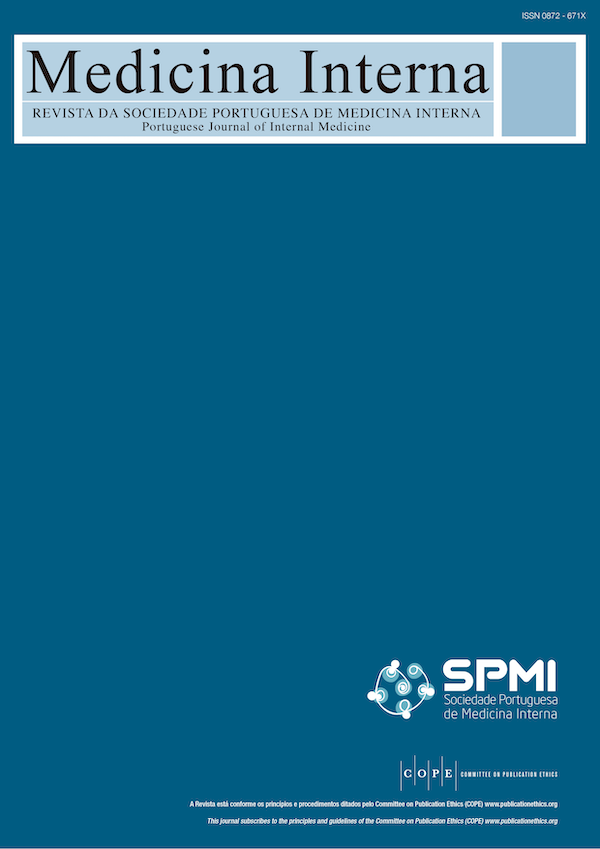Relationship Between Type of Ischemic Stroke with Degree of Dysphagia, Aspiration Pneumonia, and Mortality: A Three-Year Portuguese Stroke Unit Experience
DOI:
https://doi.org/10.24950/O/296/20/3/2021Keywords:
Deglutition Disorders/mortality, Pneumonia, Aspiration/mortality, Stroke/mortalityAbstract
Introduction: Aspiration pneumonia is a severe complication of stroke, related to higher stroke severity, functional impairment and dysphagia grade, increasing mortality rate, length of hospitalization and health costs. The study aims to analyse the relationship between aspiration pneumonia, the clinical type and severity of ischemic stroke and its consequences and outcomes.
Material and Methods: A retrospective study aanalysed 1116 patients admitted to a Portuguese stroke unit between 2017 and 2019, selecting and characterizing ischemic strokes according to Bamford Stroke Classification. The functional status was quantified with the modified-Rankin and Barthel scales, the severity of stroke was evaluated with the National Institutes of Health Stroke Scale, and the dysphagia status was accessed with the Gugging Swallowing Screen. These scales were evaluated at admission and discharge. Aspiration pneumonia was identified based on clinical, laboratory and radiologic findings.
Results: A population of 937 individuals (51.5%), and average age 75.6 years old. Prevalence of aspiration pneumonia of 19.5%. Total anterior circulation infarction with higher rate of aspiration pneumonia (74.3%). The functional status, severity of stroke, and grade of dysphagia were worse in the aspiration pneumonia group. The overall mortality rate was 11.6%, with an average length of 11.0 days of hospitalization, being statistically significant (p < 0.01) in the aspiration pneumonia group (40.4% and 13.8 days, respectively).
Discussion/Conclusion: Aspiration pneumonia is related to the severity of stroke, functional status, and grade of dysphagia, being related to higher mortality rates and longest length of stay.
Downloads
References
Ouyang M, Boaden E, Arima H, Lavados PM, Billot L, Hackett ML, et al. Dysphagia screening and risks of pneumonia and adverse outcomes after acute stroke : An international multicenter study. Int J Stroke. 2020;15:206-15. doi: 10.1177/1747493019858778.
Park KD, Kim TH, Lee SH. The Gugging Swallowing Screen in dysphagia screening for patients with stroke: A systematic review. Int J Nurs Stud. 2020;107.
Field M. Implementing Cough Reflex Testing in a Clinical Pathway for Acute Stroke : A Pragmatic Randomised Controlled Trial implications such as aspiration pneumonia and. Dysphagia. 2018;33:827-39. doi: 10.1007/s00455-018-9908-5.
Teuschl Y, Trapl M, Ratajczak P, Matz K, Dachenhausen A, Brainin M. Systematic dysphagia screening and dietary modifications to reduce stroke-associated pneumonia rates in a stroke-unit. PLoS One. 2018;13:e0192142. doi: 10.1371/journal.pone.0192142.
Teh WH, Smith CJ, Barlas RS, Wood AD, Bettencourt-Silva JH, Clark AB, et al. Impact of stroke-associated pneumonia on mortality, length of hospitalization, and functional outcome. Acta Neurol Scand. 2018;138:293-300. doi: 10.1111/ane.12956.
Yu KJ, Moon H, Park D. Different clinical predictors of aspiration pneumonia in dysphagic stroke patients related to stroke lesion. Medicine. 2018;97:e13968. doi: 10.1097/MD.0000000000013968.
Aoki S, Hosomi N, Hirayama J, Nakamori M. The Multidisciplinary Swallowing Team Approach Decreases Pneumonia Onset in Acute Stroke Patients. PLoS One. 2016;11:e0154608. doi: 10.1371/journal.pone.0154608.
Virvidaki IE, Dimakopoulos G, Giannopoulos S, Nasios G, Michou E. Predictive value of a novel pragmatic tool for post - stroke aspiration risk : The Functional Bedside Aspiration Screen. Neurogastroenterol Motil.2019;31:e13683. doi: 10.1111/nmo.13683.
Mandell LA, Niederman MS. Aspiration Pneumonia. N Engl J Med. 2019;380:651-663. doi: 10.1056/NEJMra1714562.
Arnold M, Liesirova K, Broeg-morvay A, Meisterernst J. Dysphagia in Acute Stroke : Incidence, Burden and Impact on Clinical Outcome. PLoS One. 2016;11:e0148424. doi: 10.1371/journal.pone.0148424.
Ribeiro PW, Cola PC, Gatto AR, Silva RG, Luvizutto GJ, Braga GP, et al. Relationship Between Dysphagia, National Institutes of Health Stroke Scale Score, and Predictors of Pneumonia After Ischemic Stroke. J Stroke Cerebrovasc Dis. 2015;1–7. doi: 10.1016/j.jstrokecerebrovasdis.2015.05.009
Feng M, Lin Y, Chang Y, Chen C, Chiang H, Huang L, et al. The Mortality and the Risk of Aspiration Pneumonia Related with Dysphagia in Stroke Patients. J Stroke Cerebrovasc Dis. 2019;28:1381–7. doi: 10.1016/j.jstrokecerebrovasdis.2019.02.011
Krajczy E, Krajczy M, Luniewski J, Bogacz K, Szczegielniak J. Assessment of the effects of dysphagia therapy in patients in the early post-stroke period: A randomised controlled trial. Neurol Neurochir Pol. 2019;53:428–34.
Cohen DL, Roffe C, Beavan J, Blackett B, Fairfield CA, Hamdy S, et al. Post-stroke dysphagia: A review and design considerations for future trials. Int J Stroke. 2016;11:399-411. doi: 10.1177/1747493016639057.
Sanivarapu RR, Gibson JG. Aspiration Pneumonia. StatPearls. 2019;651–63.
Sun J, Li Z. Study on the correlation between barium radiography and pulmonary infection rate in the evaluation of swallowing function. Clinics. 2018;73:e182. doi: 10.6061/clinics/2018/e182.
Downloads
Published
How to Cite
Issue
Section
License

This work is licensed under a Creative Commons Attribution-NonCommercial 4.0 International License.
Copyright (c) 2023 Medicina Interna






